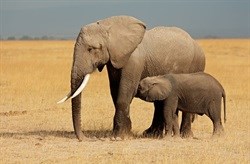Since the beginning of January 2014, not a single week has passed without law enforcers confiscating shipments of ivory.
"Every seizure of ivory represents the slaughter of elephants wherever they live, but mostly in Africa, in countries where poverty and political insecurity make it possible for poachers and trafficking cartels to operate unhindered," says Jason Bell, director of the International Fund for Animal Welfare (IFAW) Elephant Programme.
"As animal lovers around the world get ready to celebrate World Elephant Day on Tuesday, 12 August, it's worth reflecting that, since the beginning of January, not a single week has passed without law enforcers confiscating shipments of ivory - both large and small. At least 35,000 elephants a year die the cruelest of deaths to supply the trade.
"In seven months we've seen nearly ten tons of ivory seized in large scale consignments - those over 500kg which Interpol, the global security agency, say are the indicators of organised crime being behind illicit ivory trade," said Bell. "This figure does not include the numerous other seizures smaller than 500kg."
Trafficking exit port
In January Togo intercepted four tons of ivory, its biggest bust ever. Togo is believed to have fewer than 200 elephants remaining in the wild, but is emerging as an important trafficking exit port from Africa. Cambodia made its biggest ivory seizure ever in May when authorities seized three tons of ivory.
Other substantial seizures included a 2.1 ton seizure in Mombasa, Kenya in early June, and 790kg of ivory in Hong Kong, found hidden in luggage on board a flight to Cambodia, and which had originated in Angola.
Most illegal ivory is destined for Asia, in particular China, where it has soared in value as an investment vehicle and is coveted as 'white gold'. Availability of legal ivory in China purchased form the stockpile sale in southern Africa in 2008 has, in turn, boosted demand encouraging illegal ivory trade and the poaching of elephants to meet market needs.
The only way countries are going to stop poaching of elephants and illegal trade is by cooperating with agencies such as Interpol, and the law enforcement bodies of other governments to map and profile those behind this transnational criminal activity and dedicate the resources needed to reduce the capacity of those who seek profit from ivory trafficking.
Greater awareness
The future for elephants may appear bleak, but Bell said there is much that is positive with regards to worldwide action to save elephants. There is greater awareness and commitment from governments, law enforcers and civil society than ever to co-operate to bring an end to the slaughter of elephants.
"So far this year four countries - China, France, Chad and Belgium - have destroyed their ivory stockpiles; we've seen organisations like the Convention on International Trade in Endangered Species (CITES) single out a further 11 countries, bringing to 19 the countries CITES demands institute national action plans to protect elephants and prevent illegal ivory trade, and organisations like IFAW are partnering with influential institutions like the Clinton Global Initiative to work with African leaders to stop the killing, stop the trafficking and stop the demand to save elephants," said Bell.















































